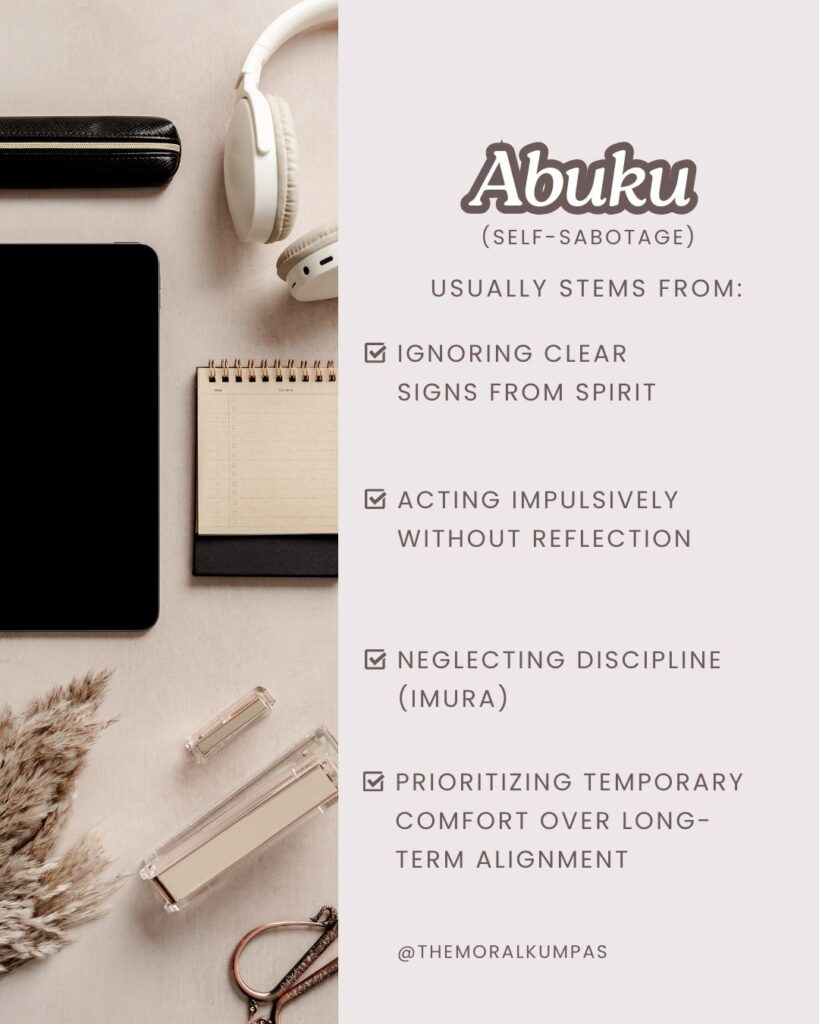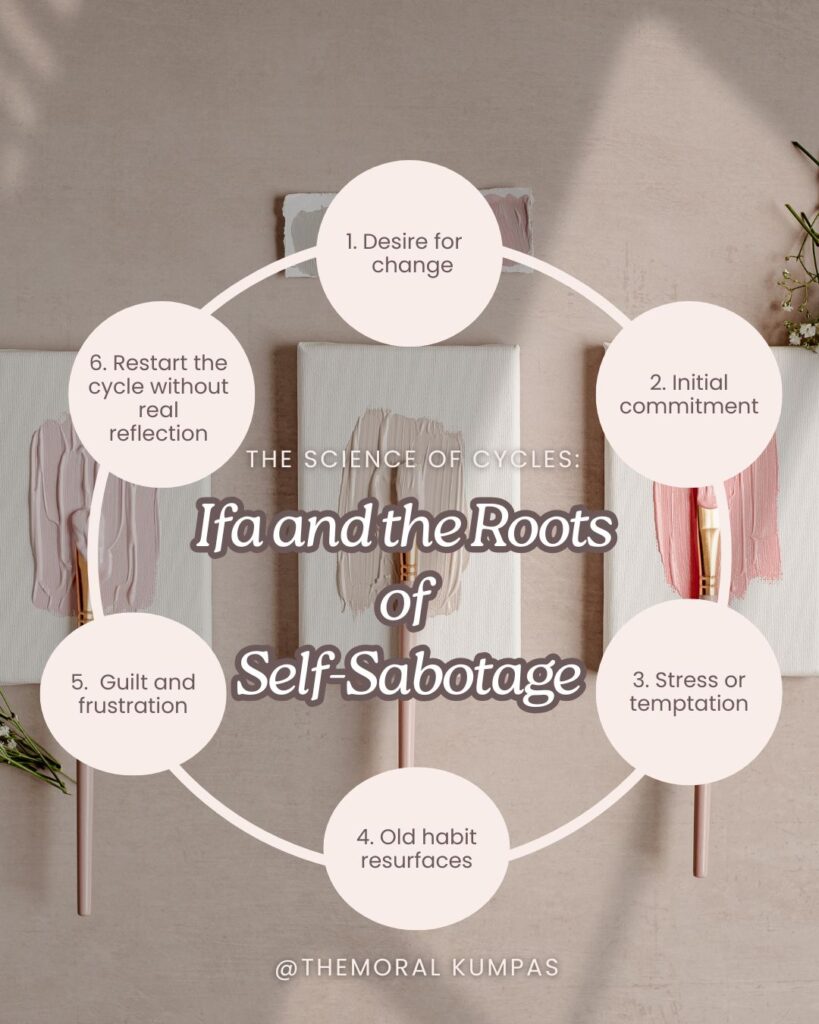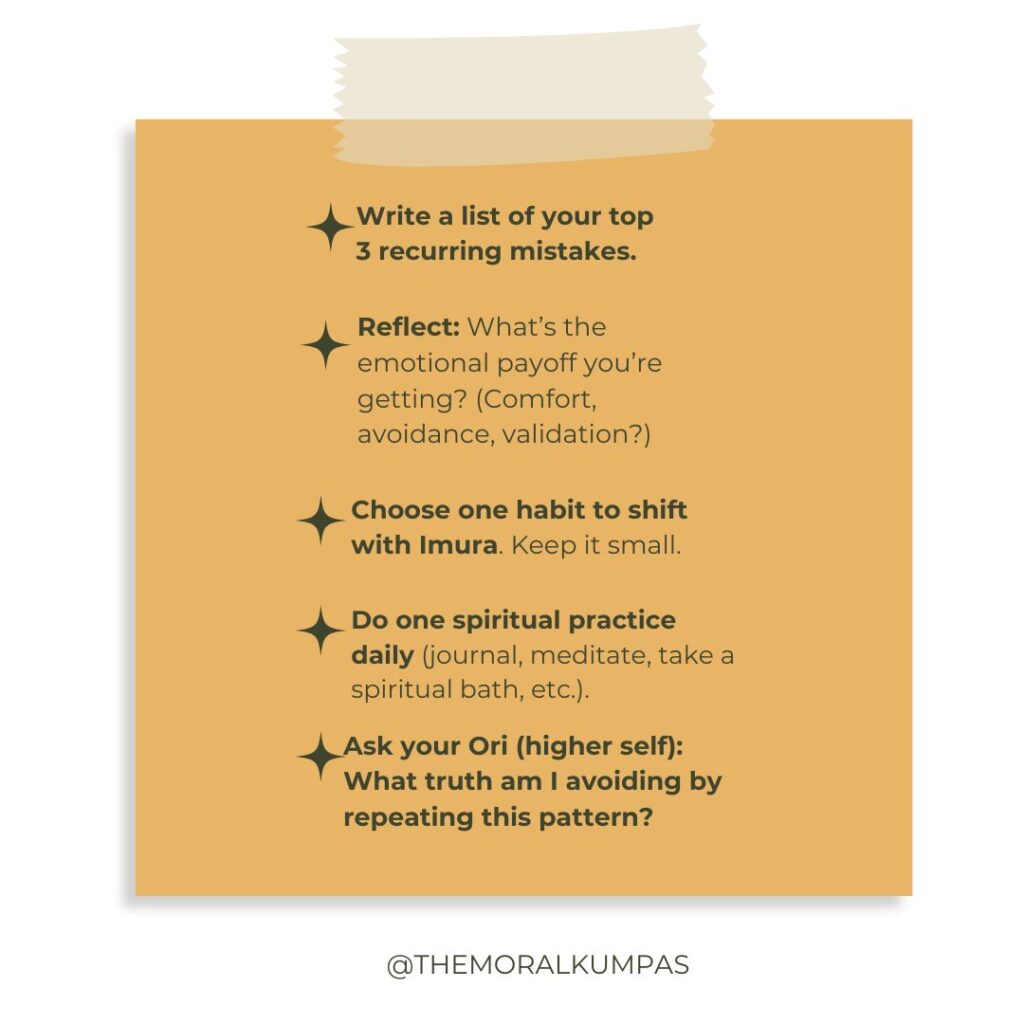WHY WE REPEAT MISTAKES – THE IFA CONCEPT OF ABUKU (SELF-SABOTAGE CYCLES).

Why Do We Keep Making the Same Mistakes?
You start fresh. You commit to change. And then—bam—you fall into the same old trap. Again.
It’s frustrating, exhausting, and often deeply emotional. In the spiritual science of Ifa, this cycle is known as Abuku—a pattern of self-sabotage rooted in unresolved habits, thinking errors, and spiritual imbalance.
The good news? Ifa doesn’t shame you for falling short. It offers clear, compassionate wisdom for breaking free.
Heads Up! Before we dive in, check out the Mini Weekly Flow to get started.
I’ve bundled a weekly resource for the most important areas of your life: love/relationships, career/finances, mindset/self-awareness and more to make reaching your goals simple. To take control of your life and make things simple, you can start planning your week ahead when you signup for your free weekly mini-flow newsletter.
What Is Abuku in Ifa?
In the Ifa tradition, Abuku refers to a recurring disruption or misstep that causes unnecessary suffering. It’s the energetic fingerprint of repetitive negative behavior—especially when we know better but do it anyway.
According to Ifa, Abuku usually stems from:

Abuku is not “punishment.” It’s feedback.
The Science of Cycles: Ifa and the Roots of Self-Sabotage
Ifa teaches that everything moves in cycles. When you’re caught in Abuku, you’re repeating an energetic loop because something in your character, behavior, or environment hasn’t been healed or addressed.
Here’s how the cycle looks:

Ifa offers us tools—rituals, reflection, divination, and community accountability—to interrupt the cycle at the root.
Breaking Free: Ifa’s Wisdom for Ending Self-Sabotage
Want to stop repeating the same mistakes?
Ifa says: Begin with discipline, not willpower.
Here’s how to apply Ifa’s ancient tools to modern self-mastery:
1. Practice Imura – Daily Discipline as a Spiritual Tool
Discipline in Ifa isn’t rigid or punitive. It’s about daily, ethical actions aligned with your higher self. It’s how we train the spirit to stay aligned under pressure.
Example: Instead of saying, “I’ll stop scrolling late at night,” commit to a 10-minute bedtime wind-down ritual—every night.
2. Use Divination to Reveal Root Patterns
When you feel stuck, turn to divination (like cowrie shells or Obi) to uncover the energetic roots of your Abuku. You may find that your actions are out of alignment with your destiny path. (Through a priest or priestess).
3. Reflect Before Reacting
Create a daily moment of stillness to ask:
“Am I operating from habit or higher guidance?”
This reflection prevents impulsive decisions that feed the sabotage cycle.
4. Use Sacred Speech (Oro Siso) to Rewire Your Mind
Ifa teaches that words carry Ashe (spiritual power).
Repeating affirming proverbs, Oriki (praise poetry), or wisdom snippets can re-pattern self-sabotaging thoughts.
Real-Life Example: Breaking a Financial Sabotage Pattern
Meet Ayo. Every time she starts saving money, she finds herself impulsively spending when stressed. After a divination session, she discovered her Abuku pattern was tied to fear of scarcity from childhood trauma.
Using daily Imura practices—like budgeting at dawn (a sacred Ifa time) and using spiritual baths to calm money anxiety—she slowly replaced panic-spending with intention.
Her breakthrough wasn’t instant. It was incremental, grounded, and spiritual.
Action Steps to End Self-Sabotage This Month

In Closing: Your Mistakes Aren’t Failures—They’re Messages
Abuku is your spirit waving a red flag, saying:
“You’re better than this. Let’s try again—with alignment this time.”
Ifa reminds us that change doesn’t happen through shame, but through clarity and courage.
Use this month’s Habit Revolution theme to practice small, steady, spirit-led shifts.
One choice at a time, you can transform your habits—and your destiny.
Explore more Ifa-inspired mindset tools in the Mindset & Clarity (Èrò) Library
When you’re ready for more structure, clarity of goals, discipline, and ease in your daily life, I would love to hand you the weekly strategies, plans, and action steps included in The Weekly Flow Membership. With months of action plans, mindset adjustment strategies, real-world examples, and more at inside the library, your relief from lack of direction, stress, or going in circles is within reach.
I’m so amped to share with you my newest release inside the membership. I’m not only the founder. I’m also a life long student! Members of our exclusive community just received their weekly strategies mapped out for them, including unlimited access to everything you see below, which includes months of strategies, insights, mindset shifts, and more.


